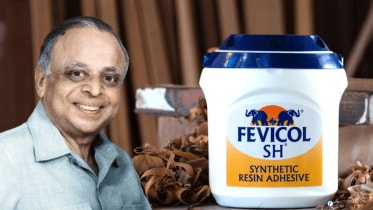From school projects to sticking together a broken household item, Indians for decades have trusted Fevicol. This brand has become synonymous with adhesives in India and is one of the essentials in every Indian household. The man behind this legacy brand, Blavant Parekh, the founder and Chairman marketed the product for the first time in 1959. The first-generation entrepreneur had to overcome a series of hindrances in order to reach the pinnacle of success and create a company that has a million-dollar turnover and is still a cult favourite.
Balvant Parekh’s early life
Balvant Parekh or lovingly called, ‘BKP’ or ‘Balubhai’ was born into a Jain family. He completed his law degree from Government Law College, Mumbai but worked in a dyeing and printing press in Mumbai after that. He tied the knot while pursuing law and started working as a peon after graduating. He used to live in the warehouse of the wood trader he worked. With the assistance of investor Mohan, Balvant made the decision to launch his own company and began importing cycle, areca nut, and paper dyes from the West. Balvant, his wife, kid, and brother Sushil moved into a flat in Sion, Mumbai, after launching his firm.
The country was in the fight for Independence during that time and Parekh too being the youth of the nation took part in the freedom struggle before deciding to pursue law. He was active in the Quit India movement but was under pressure from his family to pursue his studies when he decided to pursue law.
Balvant Parekh’s brainchild- Fevicol
In order to market another German company, Hoechst, Balvant entered into a 50/50 cooperation with German corporation Fedco. In 1954, Balvant traveled to Germany for a month at the invitation of the managing director of Hoechst. The corporation decided to conduct business directly following the passing of Hoechst’s managing director.
According to Forbes, in 1954, Balvant and his brother Sushil established a business in Mumbai’s Jacob Circle for the selling and production of industrial chemicals, pigment emulsions, and dyes under the name Parekh Dyechem Industries. Balvant began acquiring more Fedco stock and created the glue known as Fevicol. After completing his education in the United States, Narendra Parekh, Balvant’s younger brother, also joined his company. In 1959, the business was renamed Pidilite Industries and has been operating by the same name ever since.
At the conclusion of the fiscal year 2020, Pidilite Industries Limited had a net worth of around $44.65 billion Indian rupees and had assets worth $29.95 million as of FY2022 as per Statista.
As per Money Control, from Rs. 2,507.10 crore in March 2022 to Rs. 2,689.25 crore in March 2023, net sales increased by 7.27%.
Parekh was more than a businessman
He was a leader and an inspiration. People who knew BKP well described him as a remarkable person with a complex personality. He always kept in touch with everyone who came to him and became an important figure in their lives. He has been variably characterised as a man with a “humane scientific temperament” and a man who was dedicated to “creating a legacy of knowledge and virtue”.
Parekh was a voracious reader and a book enthusiast, and his personal library showed his deep interests in literature, science, law, general semantics, medicine, and psychology. It also had 12 volumes of Gamtano Kariye Gulal, which contains poems, quotes, and articles that influenced his thoughts.
Balvant had been quote active in doing good for society. In Mahuva, he established two schools, a college, and a hospital. He made a substantial contribution to the development of the science city in Bhavnagar and founded the Darshak Foundation for research into Gujarati and Indian cultural history.
Additionally, he established endowments and offered the Parichay Trust, Forbes Sabha, Gujarati Sahitya Parishad, and Gramme Nirman Samaj significant advice. He founded the Balvant Parekh Centre for General Semantics and Other Human Sciences to further general semantics research in India, keeping true to his philosophy of giving people the best of everything.
BKP became the first Asian to receive the renowned J Talbot Winchell Award on October 28, 2011, from The Institute of General Semantics in Texas.
According to Forbes, his net worth at the time of his death in 2013, was $1.36 billion.
